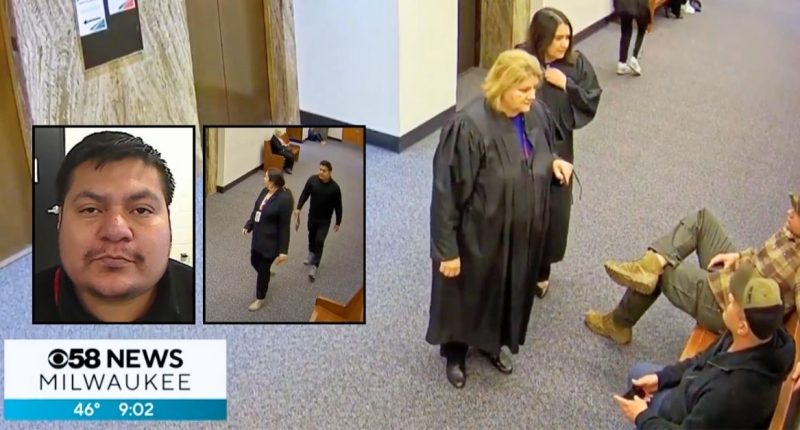Share this @internewscast.com
Background: Surveillance video captures Milwaukee County Judge Hannah Dugan conversing with ICE agents prior to the detainment of Eduardo Flores-Ruiz (WDJT/YouTube). Left inset: Eduardo Flores-Ruiz (Department of Homeland Security). Right inset: Surveillance footage depicting Eduardo Flores-Ruiz exiting the Milwaukee County courthouse (WDJT/YouTube).
A Wisconsin state judge facing allegations of obstructing government agents during an immigration operation is requesting the dismissal of federal obstruction charges, claiming her actions are protected under broad judicial immunity, akin to the immunity the president enjoys against prosecution for official conduct.
Judge Hannah C. Dugan of Milwaukee County was indicted last month over accusations that she assisted an undocumented immigrant in eluding federal authorities soon after he had appeared in her courtroom for a domestic abuse case.
Much of Dugan’s argument for dismissal hinges on the U.S. Supreme Court last year granting presidents far-reaching immunity from criminal prosecution.
“At least as to presidents, even acts at the ‘outer perimeter of his official responsibility’ are entitled at least to a presumption of immunity, a 37-page motion to dismiss filed Thursday in the U.S. District Court for the Eastern District of Wisconsin states. “Nothing in Trump suggests that judicial immunity is any less broad than presidential immunity, for purposes here.”
Attorneys representing her in the matter wasted no time in promptly painting a portentous picture about the circumstances and implications surrounding the judge’s arrest.
“This is an extraordinary prosecution that poses a threat to federalism and judicial independence. In practical terms of American governmental design, consider starkly what it proposes,” the motion opens. “One morning, plainclothes federal agents with badges and baseball caps on a bench outside a state courtroom decided how they wanted a judge to control that courtroom and the people in and near it. For not doing as they wished, the judge faces federal criminal charges.”
Love true crime? Sign up for our newsletter, The Law&Crime Docket, to get the latest real-life crime stories delivered right to your inbox.
According to Dugan, the concept of judicial immunity is rooted in the 10th Amendment — the allocation of power retained by the states and denied the federal government — and dates back more than 400 years in common law.
The Trump administration is endeavoring to upend such a foundational principles of law through her prosecution when such principles have long stood as “bars to prosecution” in cases such as this, Dugan argues.
“Dismissal here flows from a straightforward application of long-settled law,” the motion states. “The indictment itself is an ugly innovation. Its dismissal will not be.”
The judge then digs into the U.S. Supreme Court’s landmark ruling in Trump v. United States, where the justices controversially held that a sitting president enjoys “absolute immunity from criminal prosecution for actions within his conclusive and preclusive constitutional authority.” That decision repeatedly cited to and relied on the reasoning in Pierson v. Ray, a 1967 case reiterating immunity for judges for acts committed within their judicial discretion, “even when the judge is accused of acting maliciously and corruptly.”
“If the Pierson holding suggested presidential immunity to criminal liability, it expressly did the same for judicial immunity,” Dugan asserts.
The filing argues that Pierson, Trump, and similar cases have all “recognized that common law had not distinguished between absolute judicial immunity from civil and criminal liability related to official acts.”
“Trump did nothing to upend this deeply rooted judicial immunity from criminal liability. Rather, it clarified that the President is entitled to the same immunity from prosecution for official conduct that judges have long held,” the motion states (citations removed). “In short, only conduct plainly well outside the scope of a judge’s job and official acts has no immunity at all. Today, then, an American judge has immunity from prosecution for official acts, except for acts that violate basic constitutional liberties of an individual.”
Dugan, who is also accused of falsely telling agents that they needed to obtain a judicial warrant to take Flores-Ruiz into custody, has pleaded not guilty to the charges she faces, which include obstructing or impeding a proceeding before a department or agency of the United States and concealing an individual to prevent his discovery and arrest. Each charge carries a maximum penalty of six years in prison and up to $350,000 in fines if convicted on both counts.
Earlier this month she filed a similar motion in which she asserted that her immunity from prosecution “is not a defense to the prosecution to be determined later by a jury or court,” but rather, “it is an absolute bar to the prosecution at the outset.”
A trial date in the case has been set for July 21.















